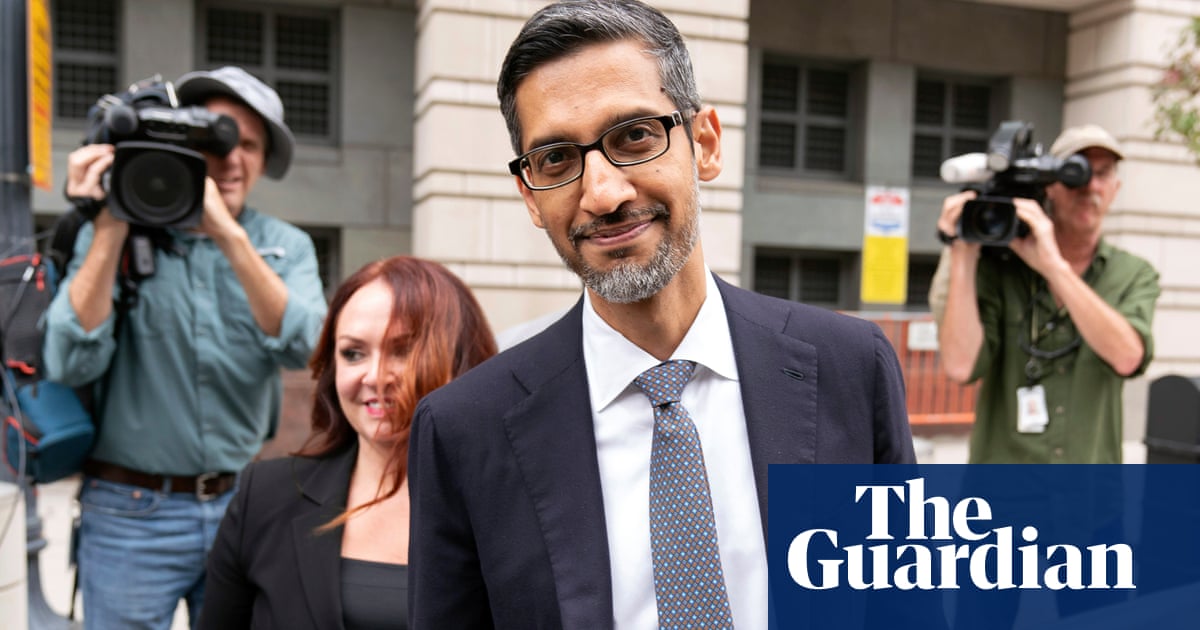
Google’s CEO, Sundar Pichai, testified Tuesday as a witness in the antitrust trial between the company he leads and Fortnite developer Epic Games, which has accused the internet search giant of abusive, monopolistic practices enacted through its app store. The trial could force Google to alter the business and distribution model of its Google Play store, which controls the vast majority of app downloads for Android phones.
Asked by Google’s attorney whether Google intentionally stifles competition, as Epic has alleged, Pichai said it does not.
“Our mission is to provide access to information, to make it universally accessible and useful. Android is unprecedented, there’s never been a free and open operating system that’s reached two and a half billion users,” Pichai said.
His testimony covered the “sideloading” of apps – the downloading of an app from a source other than the official Google Play store – and the Play store’s fees.
Epic’s attorney asked Pichai about Google’s policy of not retaining chat histories, which has been a matter of contention throughout the trial. Pichai said he himself followed instructions to retain emails, documents and chat logs.
Judge James Donato asked whether it was Google’s policy to allow individual employees to determine which conversations should be preserved as evidence via settings that preserved chat histories. Pichai answered yes. Donato is displeased with the tech giant after Epic demonstrated that Google employees deleted chats either unwittingly or on purpose after Epic placed an evidentiary hold on Google’s records. The judge has demanded Google’s chief legal officer come to court and explain the company’s policies Thursday, per the Verge.
Pichai also confirmed that Google pays Apple a 36% revenue share to remain Safari’s default search engine, between $18bn and $20bn every year. The previous day, a top economist for Alphabet revealed the figure while on the witness stand, which Google had sought to keep confidential.
Epic is alleging Google “illegally monopolized the Android app distribution market” to stifle consumer choice, extract fees from developers and stop rival companies from launching their own app stores. Google has denied any wrongdoing, arguing that its dominance over Android downloads is the result of successful business practices and competition with Apple’s app store. It is also counter-suing Epic for breach of contract.
The jury trial, which began last week in a San Francisco federal court, is yet another recent high-profile legal battle for Google as it faces challenges to its longstanding business models and market dominance. The company is currently defending itself in a separate antitrust trial brought by the justice department, which alleges that Google illegally built a monopoly over internet search and web advertising. Government prosecutors in that trial questioned Pichai in late October, forcing the CEO to justify Google’s multibillion-dollar partnerships with companies like Apple that allow it to be the default search engine on devices.
Epic’s lawyer’s have argued that Google’s Play store – which takes a 15% cut of subscription-based app purchases made on Android, or a 30% cut for developers that make more than $1m a year in revenue from those purchases – has created a system in which developers must pay off Google or be cut out of the market. During the trial, Epic’s lawyers also claimed that Google negotiated special agreements with services such as Spotify to keep their business, though never with Epic. Epic’s complaint alleges that Google has additionally struck deals with developers such as Activision to prevent them from creating their own app stores, further restricting competition.
Throughout the trial’s first week, Epic’s lawyers suggested that Google sought to obscure the tech giant’s business practices and conceal potential evidence by deleting internal chat logs. In one exhibit from the case, Pichai appeared to request that the chat history settings for a group at the company be turned off. Donato ruled earlier this year that Google should be sanctioned for failing to preserve evidence, as it was required to do by a litigation hold. Epic’s lawyers have also presented statements from the Google executive James Kolotouros, who oversees partnerships with Android device makers, complaining in a notepad file about work at the company, including one that asked: “Why am I defending these people?”
“Lack of honesty at Android leadership. Lie to your face and stab you in the back,” Kolotouros’s document stated, according to the Verge.
Epic first filed its suit in 2020 after both Google and Apple removed Fortnite from their app stores. The deletion was the result of a dispute that began with Epic launching a new payment system within Fortnite that attempted to avoid the commission fees that the app stores charge developers. Epic launched a similar suit against Apple that went to trial in 2021, alleging that the company’s app store violated antitrust laws, but the ruling largely sided with Apple and found that the iPhone maker did not hold an unfair monopoly. The court did, however, rule that Apple had violated a California unfair competition law. Unlike Epic’s trial with Google, there was no jury in the Apple trial and a judge alone issued the decision. Both Apple and Epic have requested that the supreme court take on the case.
Epic is not seeking any monetary damage in its case against Google, which is expected to be decided at some point next year. Epic’s CEO, Tim Sweeney, is also expected to testify in the coming weeks.
Google and Epic declined to comment on the record for this article.












